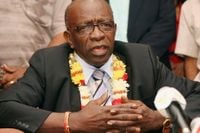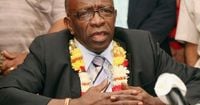After a decade-long courtroom battle that gripped both the football world and the Caribbean nation of Trinidad and Tobago, former FIFA vice president Jack Warner has secured a decisive legal victory: he will not be extradited to the United States to face a sweeping array of corruption charges. The decision, handed down Tuesday, September 23, 2025, by the High Court in Port of Spain, brings to a close one of the most high-profile and contentious extradition cases in recent sporting history.
Jack Warner, now 82, has been at the center of global football’s darkest scandal since 2015, when the U.S. Department of Justice indicted him on 47 counts, including racketeering, wire fraud, money laundering, and bribery. The charges stemmed from an explosive investigation into FIFA, soccer’s world governing body, that led to the arrest and prosecution of numerous top officials and cast a long shadow over the sport’s leadership. According to AFP and Naija News, Warner’s case became a symbol of the far-reaching impact of the so-called “FIFA-gate” scandal, which saw senior executives detained in Zurich and banned from football for life.
For the past ten years, Warner has fought tooth and nail to avoid extradition. His legal odyssey took him from Trinidad and Tobago’s local courts all the way to the Judicial Committee of the Privy Council in London, the country’s highest court of appeal. In November 2022, the Privy Council dismissed Warner’s appeal against extradition, seemingly clearing the way for his transfer to U.S. authorities. But the legal wrangling didn’t stop there.
On September 12, 2025, Warner’s lead attorney, Fyard Hosein, presented a pivotal argument before the Trinidad and Tobago High Court. Hosein contended that there was no valid extradition agreement between Trinidad and Tobago and the United States at the time the American arrest warrant was issued in 2015. Without such a treaty in place, Hosein argued, the entire extradition process was fundamentally flawed and could not proceed. The judge agreed.
"The present extradition proceedings are permanently stayed," declared Justice Karen Reid at the close of Tuesday’s hearing, confirming Warner’s release from custody after years of uncertainty and legal limbo, as reported by Naija News and AFP. Warner, who had been out on $370,000 bail throughout the drawn-out legal saga, was finally free from the threat of extradition that had loomed over him for a decade.
Warner’s reaction to the verdict was a mix of relief and lingering bitterness. Speaking to AFP after the decision, he reflected on the toll the case had taken on his life and reputation: "Nothing could take away the pain and humiliation I felt for the past 10 years and don’t forget my incarceration." Warner’s words captured both the personal cost of his legal ordeal and the public spectacle that had surrounded his name since the scandal broke.
At the heart of the U.S. indictment were allegations that Warner had abused his powerful roles within FIFA and the Confederation of North, Central America and Caribbean Association Football (CONCACAF) for personal gain. U.S. prosecutors accused him of orchestrating and accepting millions of dollars in bribes and kickbacks, including alleged involvement in a bribery scheme related to the 2010 World Cup. According to AFP and Naija News, Warner was also one of the influential FIFA executive committee members who voted to award the 2018 and 2022 World Cup hosting rights to Russia and Qatar, decisions that have since come under intense scrutiny worldwide.
Warner’s notoriety is not confined to the courtroom. For decades, he was a towering figure in Trinidad and Tobago’s sporting landscape, serving as president of the national football federation. Under his leadership, the country made its historic debut at the 2006 FIFA World Cup in Germany—the only time Trinidad and Tobago has ever qualified for the prestigious tournament. That achievement, once a source of national pride, has been overshadowed by the corruption allegations and Warner’s subsequent fall from grace.
FIFA, for its part, banned Warner for life in 2015, citing his central role in the corruption scandal that rocked the organization to its core. The ban, announced in the same year as the U.S. indictment, was a public declaration that the sport’s governing body was attempting to clean house after years of alleged malfeasance at the highest levels. Warner’s expulsion from football was mirrored by similar bans and prosecutions for other top officials, many of whom were arrested in dramatic fashion at a luxury hotel in Zurich—an event that signaled a new era of accountability, or at least the attempt at it, within FIFA.
The legal battle over Warner’s extradition has drawn international attention not only because of the personalities involved, but also due to the complex web of treaties and diplomatic agreements that underpin such proceedings. As reported by AP and AFP, the crux of Warner’s defense rested on the absence of a formal extradition agreement between Trinidad and Tobago and the United States at the critical moment when the American authorities sought his arrest. This technicality, ultimately accepted by Justice Reid, proved decisive—underscoring how international law can sometimes hinge on the finest of details.
For the people of Trinidad and Tobago, Warner’s saga has been both a source of embarrassment and fascination. Once celebrated as a national hero for his contributions to football, Warner’s legacy is now inextricably linked to the global corruption scandal that forever altered the landscape of the sport. His supporters argue that he has been unfairly targeted and subjected to years of humiliation without a fair trial in the U.S., while critics maintain that the High Court’s decision represents a failure to hold powerful figures accountable for their actions.
Meanwhile, U.S. prosecutors are left empty-handed after years of effort and international cooperation. The decision by Trinidad and Tobago’s High Court means that, barring any extraordinary diplomatic developments, Warner will not face trial in the United States for the charges laid out in the 47-count indictment. The ruling is final, and the extradition proceedings are permanently stayed.
As the dust settles, the Warner case stands as a cautionary tale about the limits of international justice, the intricacies of extradition law, and the enduring impact of scandal on sport and society. For Jack Warner, the battle may be over, but the questions—and the controversies—are likely to linger for years to come.


